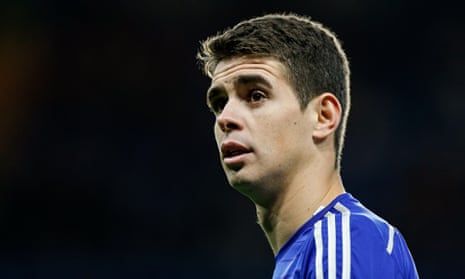Chelsea are to express their dismay to the Football Association that an expert who sits on its concussion panel was quoted publicly claiming the club’s treatment of Oscar’s recent head injury was “completely unacceptable”.
Dr Willie Stewart, a leading neuropathologist, was quoted in the Mail on Sunday this month commenting on the knock sustained by the Brazil international in the goalless draw at Arsenal. Oscar had collided with the home goalkeeper, David Ospina, in the 16th minute and, after receiving treatment on the pitch, was substituted at half-time having experienced facial swelling. The player was checked over at a local hospital.
Premier League guidelines state any player who has suffered a concussion must undergo a six-day return-to-play protocol. Chelsea deny the midfielder suffered concussion and named him on the bench for the midweek game at Leicester three days later. “He didn’t have a head injury,” said José Mourinho on Friday. “He had contact, strong contact with Ospina. It was not a head injury. The medical department were fantastic with the treatment they gave him. After that he had a [thigh] injury.” That leg injury has ruled Oscar out for the remainder of the season.
Yet Chelsea were unimpressed to read Dr Stewart’s subsequent comments about the collision with Ospina, and the implied criticisms of the conduct of their medical department, and believe they contravene General Medical Council guidelines given he had judged the case without being party to any of the clinical facts. They will argue to the FA that his willingness to comment effectively amounts to inappropriate conduct.
Although the FA’s chief medical officer, Ian Beasley, declined to comment on Oscar’s specific case at the time, Dr Stewart had been more forthcoming. “I’m amazed that, in 2015, he stayed on the field,” he said. “The much talked-up Premier League protocols state any suspicion of loss of consciousness, ‘the player must be removed from the field of play’ and that, where there is any doubt, evidence from players, match officials and video evidence should be used.
“It’s hard to accept ‘We didn’t see it’ applies in this case. But even if we do believe that, his appearing three days later on the bench seems at odds with all current concussion protocols. It is completely unacceptable that this kind of practice continues.”
Chelsea believe other Premier League clubs are just as uncomfortable with the fact Dr Stewart was willing to speak about a specific case without knowing all the facts and feel the comments effectively undermine the efforts of the FA’s expert concussion panel, upon which he sits. They intend to raise the issue with the governing body.
